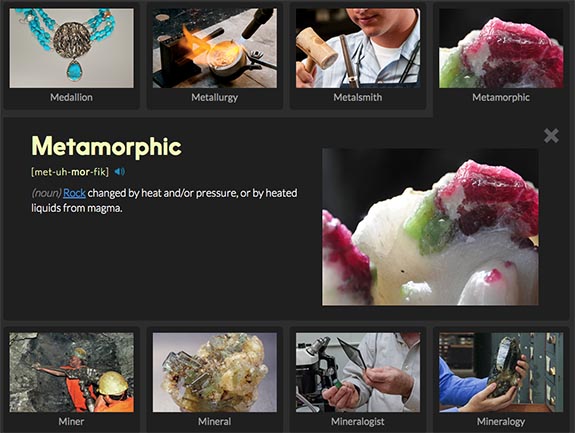April 9th, 2020
Kids think gemstones and jewelry are cool. That's why the Gemological Institute of America has put together a great website called Gemkids®.

Overflowing with colorful graphics and exciting gem photos, the site does a great job of taking gemological and historical concepts and synthesizing them into bitesize tidbits that are easy for your little ones to understand.
While the kids are home from school, encourage them to choose a favorite gemstone in the section called "Gem Explorer."

By clicking on "Emerald," for example, the kids will learn that the gem is the green variety of the mineral beryl, which also includes aquamarine.
The blue plus signs overlaying the image, offer additional fun facts about emeralds...
• Inclusions make the inside of an emerald look like a garden. The name for this garden is called a “jardin” [zhar-dan].
• Emerald crystals usually are six-sided. These crystals are grouped together.
• The tops of emerald crystals are usually flat.
The emerald page also discusses emerald's range of colors, where emerald was first mined, some famous emerald jewelry and the origin of its name. It even includes an audio link to hear a pronunciation of the word "emerald."

At the bottom of the home page is "Good Stuff," which includes a link to professions related to jewelry and gemstones, as well as the "Word of the Day," which leads to an illustrated glossary of jewelry-related terms.

If kids choose to "Enter the Jewelry Time Machine," they'll be taken through the history of jewelry, from Prehistory and the Bronze Age through the Renaissance and Victorian Eras, and ending in the Modern Era with a look toward the future.
In the feature called "The Story of a Gem: How Stones Become Rock Stars," Gemkids® offers informative pages about minerals, gems, the Mohs scale of hardness, inclusions, phenomena, gemology, pearls, types of rocks, gem mining, stone cutting, unusual gems and gem art.
While kids will certainly come away from the experience with a whole new appreciation of gems and jewelry, our guess is that mom and dad will learn a lot, too.
Credits: Kid photo by BigStockPhoto.com. Screen captures via Gemkids.gia.edu.

Overflowing with colorful graphics and exciting gem photos, the site does a great job of taking gemological and historical concepts and synthesizing them into bitesize tidbits that are easy for your little ones to understand.
While the kids are home from school, encourage them to choose a favorite gemstone in the section called "Gem Explorer."

By clicking on "Emerald," for example, the kids will learn that the gem is the green variety of the mineral beryl, which also includes aquamarine.
The blue plus signs overlaying the image, offer additional fun facts about emeralds...
• Inclusions make the inside of an emerald look like a garden. The name for this garden is called a “jardin” [zhar-dan].
• Emerald crystals usually are six-sided. These crystals are grouped together.
• The tops of emerald crystals are usually flat.
The emerald page also discusses emerald's range of colors, where emerald was first mined, some famous emerald jewelry and the origin of its name. It even includes an audio link to hear a pronunciation of the word "emerald."

At the bottom of the home page is "Good Stuff," which includes a link to professions related to jewelry and gemstones, as well as the "Word of the Day," which leads to an illustrated glossary of jewelry-related terms.

If kids choose to "Enter the Jewelry Time Machine," they'll be taken through the history of jewelry, from Prehistory and the Bronze Age through the Renaissance and Victorian Eras, and ending in the Modern Era with a look toward the future.
In the feature called "The Story of a Gem: How Stones Become Rock Stars," Gemkids® offers informative pages about minerals, gems, the Mohs scale of hardness, inclusions, phenomena, gemology, pearls, types of rocks, gem mining, stone cutting, unusual gems and gem art.
While kids will certainly come away from the experience with a whole new appreciation of gems and jewelry, our guess is that mom and dad will learn a lot, too.
Credits: Kid photo by BigStockPhoto.com. Screen captures via Gemkids.gia.edu.

